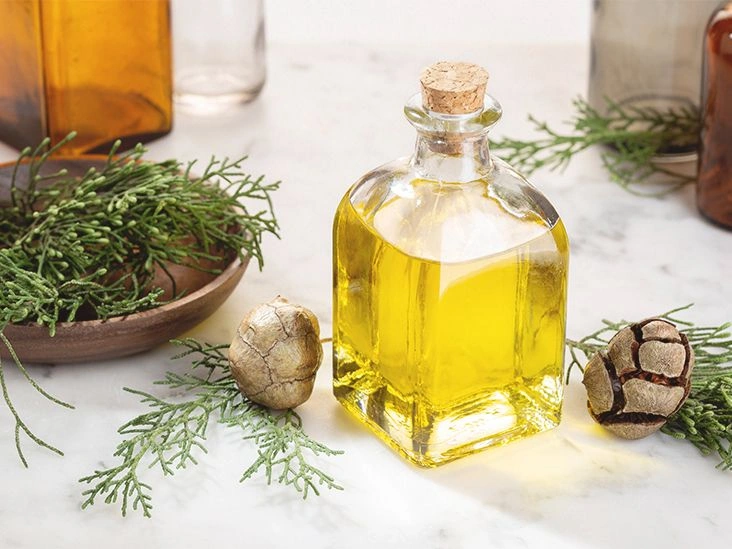Cypress oil is an essential oil extracted from the twigs, stems, and leaves of the cypress tree. It may offer some health advantages due to its antimicrobial qualities, but scientific evidence is limited.

Most cypress essential oil derives from Cupressus sempervirens, commonly called Mediterranean cypress. Most studies concentrate on oil from this specific species.
Cypress oil exhibits antibacterial, antimicrobial, and antifungal actions. People frequently use it as a home remedy for coughs, cuts, and acne.
Read on to explore more about the possible health effects of cypress oil.
Benefits of cypress oil
According to a , Cupressus sempervirens demonstrates anti-inflammatory, antiseptic, antiperspirant, and antispasmodic qualities. Below are some possible advantages of cypress oil.
Cough
Many individuals turn to essential oils to soothe coughing.
Cypress oil contains camphene, a compound commonly found in herbal cough remedies. Its anti-inflammatory action may also ease inflammation related to coughs.
However, cypress essential oil has not been directly studied for its impact on coughing.
You can inhale cypress oil by using a diffuser. Another option is to add a few drops diluted in a carrier oil to a warm bath and breathe in deeply. Consult a physician before trying this, especially if you take medications.
Hemorrhoids
Hemorrhoids are swollen veins near the rectum and anus. In , a cypress sitz bath has been employed to help reduce hemorrhoid swelling. Cypress is also included in some hemorrhoid creams and ointments.
Cuts, wounds, and infections
Because cypress essential oil is antimicrobial and antibacterial, it may assist in cleaning and healing cuts and wounds. Nevertheless, research supporting this is limited.
If you plan to use it on cuts or wounds, ensure the oil is diluted in a carrier oil first.
Pimples and acne
Pimples and acne are frequently caused or exacerbated by bacteria.
According to a on essential oils, cypress oil is often recommended for acne because of its antimicrobial nature. This suggests that topical application of cypress oil might help acne by eliminating bacteria.
Keep in mind that essential oils are highly concentrated. Dilute them in a carrier oil before applying to skin, particularly if your skin is sensitive.
Muscle pain
If you suffer from muscle soreness, essential oils may offer relief. According to the , massage therapy can be an effective method to reduce pain, particularly in the back and neck.
Cypress oil is one of several essential oils used for muscle discomfort. While it’s frequently described as an antispasmodic, meaning it may reduce muscle pain and cramps, studies have not definitively proven that cypress oil is especially effective for easing muscle pain.
Body odor
Because cypress essential oil has a pleasant scent, it’s commonly added to natural deodorants as it can help mask unpleasant body odor. It also has antiseptic properties, meaning it may target bacteria that contribute to body odor.
However, strong evidence supporting the use of cypress oil for this purpose is lacking.
Before applying any new product to the delicate skin under your arms, perform a patch test on your inner forearm.
How to use it
There are several ways to use cypress essential oil.
Essential oils are very concentrated and potent, so many people can be sensitive to them. Therefore, it’s crucial to mix any essential oil you intend to use with a carrier oil to dilute it.
Here is a list of popular carrier oils:
After diluting a few drops of cypress oil in a carrier oil, you can:
- use it in a diffuser
- add it to a bath
- apply it to your skin
- include it in soaps and body-care products
Always do a patch test before using a new essential oil on your skin, even when it’s mixed with a carrier oil.
To perform a patch test, apply a small amount of the essential oil and carrier oil mixture to your inner forearm. If you experience burning, stinging, rash, or redness, do not apply the blend to larger areas of skin.
Research indicates it’s best to avoid ingesting essential oils. Certain essential oils, including cypress oil, can be toxic if swallowed, even if they are safe to inhale or apply topically.
Risks of cypress oil
It’s a common belief that essential oils are safe because they are natural. While essential oils have many potential benefits, they can be hazardous when misused or ingested.
It’s possible to have an allergic reaction to essential oils. Symptoms of an allergic response may include:
- rash and redness
- pain or burning
- swelling
- itching
- hives
If you suspect an allergic reaction to an essential oil, stop using it immediately. If symptoms are severe, seek urgent medical care.
Keep in mind that the FDA does not regulate essential oils. Always choose high-quality oils from reputable manufacturers.
If you are pregnant or breastfeeding, avoid using essential oils. You should also refrain from using essential oils on infants, young children, or pets unless advised by a healthcare professional.
The bottom line
Cypress essential oil is a widely used home remedy with a long history in some cultures. However, scientific support for its claimed health benefits is limited.
As with any essential oil, exercise caution when applying cypress oil to your skin or using it to address health issues. If you experience any adverse reactions to cypress oil, discontinue use.


















Leave a Reply
You must be logged in to post a comment.